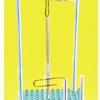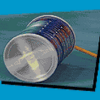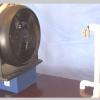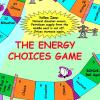Search Results
Showing results 41 to 60 of 70

A Simple Escapement Mechanism
Source Institutions
In this activity, learners build a simple mechanism that regulates the "escape" of energy released by a falling weight by portioning it into discrete amounts.

Cooling Off
Source Institutions
In this activity, learners are introduced to challenges of maintaining temperatures while living in space.

Solar Water Heater
Learners work in teams to design and build solar water heating devices that mimic those used in residences to capture energy in the form of solar radiation and convert it to thermal energy.

The Carbon Cycle: How It Works
Source Institutions
In this game, learners walk through an imaginary Carbon Cycle and explore the ways in which carbon is stored in reservoirs and the processes that transport the carbon atom from one location to another

Working with Watermills
Source Institutions
In this activity, learners explore how watermills have helped harness energy from water through the ages.

Homemade Rube Goldberg Machine
Source Institutions
In this fun and, at times, hilarious force and motion activity, learners will use household objects to build a crazy contraption and see how far they can get a tennis ball to move.

Spool Racer
Source Institutions
In this physics activity, challenge learners to make a rubber band-powered spool racer. Demonstrate principles of motion as well as potential and kinetic energy.

Racing with the Sun: Creating a Solar Car
Source Institutions
Learners use engineering design principles to construct and test a fully solar-powered car. Solar car kits usually include a photovoltaic cell and motor; some include a chassis as well.

The Carbon Cycle: Carbon Tracker
Source Institutions
In this activity, learners play NOAA's Carbon Tracker game and discover ways to keep track of carbon dioxide and other greenhouse gases in the world.

Zero-Energy Housing
In this activity, learners investigate passive solar building design with a focus solely on heating.

As the Rotor Turns: Wind Power and You
Source Institutions
In this engineering activity, learners will get acquainted with the basics of wind energy and power production by fabricating and testing various blade designs for table-top windmills constructed from

Wind Turbine Blade Design
Source Institutions
In this activity, learners design, build and test wind turbines. Learners go through the design process and use the scientific method to test important blade variables.
Hot and Cold: Endothermic and Exothermic Reactions
Source Institutions
Visitors mix urea with water in one flask and mix calcium chloride with water in another flask. They observe that the urea flask gets cold and the calcium chloride flask gets hot.

Energy Choices Board Game
Source Institutions
This board game teaches learners about energy decision making. Players select cards that determine the transportation and home design that will influence their expenses as they play.
Waves: An Alternative Energy Source
Source Institutions
In this data analysis and environmental science activity, learners evaluate the feasibility of wave energy as a practical alternative energy source using ocean observing system (OOS) buoys.
Energy Audit
Source Institutions
In this lesson, learners will practice graphing and statistically analyzing data.

A Model Nuclear Power Plant Steam Turbine
Source Institutions
In this activity (on pages 20-23 of PDF), learners build a model of a power plant using simple materials.

Energetic Musical Instruments
Source Institutions
Learners design and create musical instruments from common objects; their challenge is to create an instrument that can make three different tones.
Water Motor
Source Institutions
In this physics activity (page 10 of the PDF), learners will explore how energy from moving water can be used.

Oil Spot Photometer
Source Institutions
In this math activity related to light, learners assemble a photometer and use it to estimate the power output of the Sun.
